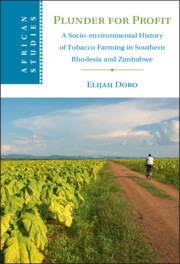 Plunder for Profit
Plunder for Profit The African Peasantry, the State and Tobacco in Southern Rhodesia, 1900–1980
Published online by Cambridge University Press: 06 April 2023
This chapter examines African peasant tobacco production in Southern Rhodesia from 1900 to 1980, from the cusp of colonialism to its end. It analyses shifting state policy towards African tobacco producers, the concomitant impact on peasant economies, accumulation patterns and the rural physical landscape and peasant responses. It focusses on the changing agricultural commodity value chains, cash crop asymmetries and global market forces to explain colonial responses to peasant production and peasant agency. The chapter argues that the symbolic value of each agricultural commodity, in entrenching the hierarchy of power relations and the institutionalisation of white control, mediated colonial responses to peasant production and concomitantly ‘peasant agency’. Furthermore, the chapter highlights the structural constraints on ‘agency’ and explores how cash crop asymmetries helped structure agrarian encounters and power relations in colonial Africa.
To save this book to your Kindle, first ensure [email protected] is added to your Approved Personal Document E-mail List under your Personal Document Settings on the Manage Your Content and Devices page of your Amazon account. Then enter the ‘name’ part of your Kindle email address below. Find out more about saving to your Kindle.
Note you can select to save to either the @free.kindle.com or @kindle.com variations. ‘@free.kindle.com’ emails are free but can only be saved to your device when it is connected to wi-fi. ‘@kindle.com’ emails can be delivered even when you are not connected to wi-fi, but note that service fees apply.
Find out more about the Kindle Personal Document Service.
To save content items to your account, please confirm that you agree to abide by our usage policies. If this is the first time you use this feature, you will be asked to authorise Cambridge Core to connect with your account. Find out more about saving content to Dropbox.
To save content items to your account, please confirm that you agree to abide by our usage policies. If this is the first time you use this feature, you will be asked to authorise Cambridge Core to connect with your account. Find out more about saving content to Google Drive.